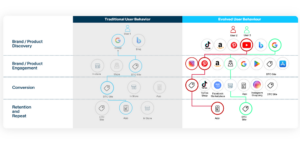- Services
- Growth Strategy
- Customer Insights
- Performance Marketing
- Global Reach
- Resources
- About
- Careers
- Contact
- 0113 212 1211
- Get in touch
The role of organic search is evolving in today’s digital landscape. According to research conducted by the Search Engine Journal in August 2023, 16.5% of SEO experts see the rise of AI and updates from Google as leading reasons for a shift in SEO habits worldwide. In addition to these changes, user journeys are becoming more fragmented, creating a significant disconnection between expected search behaviour and the organic search strategies implemented by businesses.
Marketers must start realigning their approach to organic search to thrive in this evolving ecosystem. By doing so, brands can drive future online growth through a seamless organic search experience. In this report, our Head of SEO, James Bentham, and our Director of SEO, Amy Banks, address these challenges and provide actionable guidance so marketers can future-proof organic strategies and truly maximise the value of SEO.
Due to Google’s 91% online global market share, SEO practice has mainly focused on getting the most out of Google. While that still may remain the case, user search behaviour is diversifying across other platforms because AI is changing the functionality of how search results are generated.
As AI allows platforms to deliver more in-depth, human-sounding responses to search queries, these satisfy users enough that they don’t need to click on and visit traditional organic web links that appear in SERPs. To fully understand the challenges AI presents to organic search, we need to understand how it works.
“The main challenge that everyone is talking about in the industry is AI in search. It’s an emerging technology which we don’t fully understand yet. But there’s still big opportunities for brands to get ahead of the game and prepare for these new features.”
Because aspects of the process involve proprietary technology for each platform, there could be an assumption that everything is inaccessible. Yet, interestingly, the overarching method that makes each platform work is the same.
When ChatGPT launched, it was a standard large language model (LLM). However, once an LLM has internet access, it can generate more accurate responses by locating relevant and up-to-date sources.
User journeys are becoming more fragmented due to multichannel search. Rather than traditional search engines, users now engage more with organic social media and video platforms to help answer queries.
The effect is that multichannel search creates a disconnection between search behaviour and a brand’s organic search strategy. Audience touchpoints have shifted, and content can’t exist in silo, as highlighted in this diagram:

Search journeys have increased in complexity because of how users look for and engage with brands organically. Amazon is one example of this evolution in practice and exists in its own microclimate.
For example, users can start their search journey on YouTube, move to a social media platform, and then head to Amazon to purchase a product through the website or mobile app. As multichannel search continues to rise, content must extend beyond a website.
Organic search specialists must diversify content reach to take advantage of different user pathways. But whatever content organic search specialists create, it must always be relevant. Relevancy is the key to driving successful SEO results.
“I think the biggest hurdle is going to be around having content across multiple platforms. We know that it’s always a difficult thing for brands to create lots of different formats, but it’s something we all need to get better at. Making multidisciplinary content that we can use across many different platforms and channels to keep brands as active as possible.”
In May 2024, several of Google’s senior figures said links were no longer essential and hypothesised that specific other ranking signals, such as user engagement metrics, weren’t either. However, some of Google’s internal documentation was leaked, which confirmed some long-standing hypotheses around what metrics truly power their result generation. It was revealed that user engagement metrics such as dwell time and click-through-rate are in fact used by Google to determine result quality, in addition to known signals such as link equity and content quality.
A more surprising update from Google’s senior figures regarded backlinks, with individuals saying they don’t classify them as an essential ranking factor as they once were. However, historically, backlinking has been one of SEO’s critical success factors and will continue to be when related to channels such as digital PR. The conclusion is that links are still crucial to achieve organic success. But, like all SEO, the focus must be on quality and relevancy to increase site authority.
Now that the main obstacles facing organic search have been outlined, the next step is to develop future-proofed solutions to address them and achieve sustained success.
Fill in our form on the right to find out what suggestions our experts have to address these problems. Also, learn about our innovative Accelerate SEO audit and how it can take your organic search results to the next level.